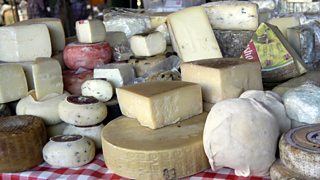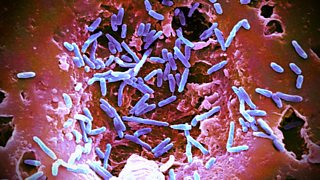How to be good to your gut (And why it matters)
Amazingly, the human gut contains around 1,000 different species of bacteria. Having a diverse range of microbes is considered good for your health, as we discover in . Low diversity has been linked to conditions such as obesity, IBS and diabetes.
Here are a few things you can do to encourage your bacteria to flourish.

1. Feed your skinny bacteria
Higher numbers of the bacteria Akkermansia are found in people who are naturally slim, leading to suggestions that these microbes could help prevent weight gain. Red grapes are one of their favourite meals.
2. Microfibre is the way forward
You can encourage a diverse range of bacteria by eating a variety of different foods. Fibre is a great food for your good bacteria and can be found in fruit, vegetables and whole-grain foods. Garlic, Jerusalem artichoke, bananas, apples, blueberries and chickpeas all encourage good guys such as Bifidobacteria.

3. Be wary of probiotic claims
There is little evidence to show that Probiotics – the dietary supplements marketed to promote a healthy gut – can change your bacterial diversity over the long term. However, probiotics have been shown to be beneficial in very young or old patients, and can prevent gastrointestinal issues arising from taking antibiotics.
4. Think sour and smelly
Naturally fermented foods, such as kefir (a Persian soured yoghurt), miso (fermented soya bean paste) and unpasteurised cheese, are thought to be beneficial sources of good bacteria.

5. The greatest gift of all
For a more extreme microbial makeover, you might consider a stool transplant. People with healthy gut bacteria are used as donors, and screened to make sure they are disease-free. Samples from their stools can then be implanted through a tube which is inserted either into the recipient’s colon, or their nose.
These transplants can be a life-saver for people who are seriously ill with bacterial diseases such as Clostridium difficil, which can infect the bowel and cause diarrhoea.
6. Take a crapsule
If that idea turns your stomach, try popping a ‘crapsule’. Stools from healthy donors are freeze-dried ready for processing. They are filtered into acid resistant capsules which can withstand the journey through the strong digestive juices in your stomach.
They finally break open inside your lower intestine, where they release their bacterial inhabitants, ready to take up residence in their cosy new home.
-
![]()
How much does the bacteria inside my body weigh? Adam has his inner microbes examined to find out what's lurking inside his guts.
More from 91热爆 Radio 4
-
![]()
Dan Saladino discovers the world of the gut microbiota.
-
![]()
Exploring our relationship with microbes in our gut.
-
![]()
Investigating how gut bacteria can influence weight.
-
![]()
Download episodes to your smartphone or tablet device.























